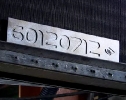The Doctor’s Daughter
[I said I’d be grumpy.][tss] Within about a minute, ‘The Doctor’s Daughter’ makes it perfectly clear that its eponymous progeny is not actually the result of a traditional pregnancy. Not a real daughter, I cried in anger, but I was surprised to find Donna and Jenny herself started arguing with me, I started to mellow. Yes, alright, plenty of kids are the results of nothing more meaningful than someone’s appendage being shoved somewhere random. Yes, alright, Georgia Moffet is adorable.
And so, for an episode that contains something of a cop-out (but makes it clear before the credits even start), ‘The Doctor’s Daughter’ isn’t really a disappointment on the fatherhood front. Yay! But let’s get to that later. I like to save something nice to say at the end. I want to start with perhaps the most irritating kind of irritation that ever irritated; the irritation of unfulfilled potential.
Let’s say you want to tell a story about meaningless stupid wars without end. Nice. Always topical. And let’s say you decide to undercut it, by saying that everyone’s dying and repopulating so quickly that it’s only been happening for a week, and people just think it’s been happening for generations. Cute. Potentially deep, even. I’m with you so far.
I guess the first thing you’d do would be to lay down some hints for the viewer. So ambiguous perhaps that they’d never guess, but the sort of thing that will click nicely into place when the revelation occurs. Perhaps everyone’s really, really shiny and new? No. Perhaps everyone’s really young?1 No. Perhaps one person really knew the truth and had almost let things slip? No. How about, just having, over the course of the story, most of the people we meet on either side die?2
Alright then, I give up. What have you got there, Mr Greenhorn? I see. A big plate with numbers on it. How evocative. Oh no, you’ve got lots of them. That’s awesome. As a foundation stone enthusiast, I’m particularly thrilled by using a rather unconvincing bunch of them as a plot point.3
Well, you’ve got your revelation. Despite not having much of a lead up, it’s still a decent idea. What shall we do with it? Will you tell the populace, and have them rebel against the idea that they could possibly have been fighting so pointlessly? Will you try to hide the truth from them? Or will you… Oh, right. You’re not even going to mention it again, are you? Gosh.
But enough with the sarcasm. You get it. ‘The Doctor’s Daughter has a bizarre central plot. It also has Martha in it; but all she does is run about getting captured and almost killed.4 It has technology which is apparently operated by being smashed on the floor. It has entire scenes filled with pointless wittering (see above), but doesn’t give us even one word hinting towards the seemingly necessary story point that there’s a limit to how many clones one person can create.
But all that almost doesn’t matter, because there’s a hot blonde running about in leather pants. No no no no no. That came out wrong. It’s because the Doctor does have to deal with having a daughter, and to an extent, his daughter has to deal with being related to someone like him. The scenes between the two are almost all excellent. While Jenny renders the Doctor speechless in their arguments about soldiering perhaps a little too easily, some of her points are quite valid, even if you discount the obvious gimme “well, you did fight in a war, so surely you’re a soldier.” Ultimately, though, the Doctor’s well-worn yet beautiful advice to Jenny is the best argument that he isn’t a soldier: “we always have a choice.”
It’s also a pleasure to see David Tennant exploring some different sides to the Doctor’s usual character. A shade of bitter to his general time war angst makes it a good deal more interesting. And hints at his family’s fate are welcome; perhaps the longest-running plot thread in Doctor Who.5 The tender moments for the Doctor also provide interesting opportunities for Donna, and almost make up for the cringe-worthy “I used to be a temp” business. Have we ever before had a companion who had to make excuses for being clever?
So after all, I’m not really disappointed that ‘The Doctor’s Daughter’ wasn’t actually about Susan’s mum. After all, the story at least explores some of the consequences of the Doctor having offspring. No, what’s really disappointing is the ridiculous backdrop that this quite touching story is told on.
- Perhaps, if Cobb had been a young man, he’d have come across far less like an obvious stereotype. ↩
- In fact, you could almost make a case that every single death in this story can be blamed on our heroes, and not the war. ↩
- Numerology can be spooky, but 8 digit sequential numbers manage to be even more dull than crossing a chessboard using the mathematical concept of pi. ↩
- I already believed she wanted to leave, and I didn’t quite understand why we needed to practically torture her for an episode just to make it super-clear. ↩
- Some people are taking this as yet another Time War thing, but judging by the Doctor’s comments, it’s older than that. The series has been touching on these things subtly for a good long while; starting with Susan, then the comments he makes to Victoria in ‘The Tomb of the Cybermen’, then the comments in ‘The Curse of Fenric’, then ‘Fear Her’, and now this. Unless I’ve missed something. And I most likely have. ↩



Andy
May 26th, 2008 at 1:20 am
What do you mean by “Does Peter Davison have this effect on women?”
Tom
May 26th, 2008 at 8:27 am
I thought that might be a bit obscure. I mean: does Peter Davison, Georgia Moffett’s father, have the same effect on women as Georgia has on me. Perhaps I should replace it with something equally unfunny but more comprehensible.
Andy
May 27th, 2008 at 1:54 am
Oh. I thought you might mean ‘does Peter Davison have the effect of making women who are his daughter good looking?’ Which seemed an odd thing to say.